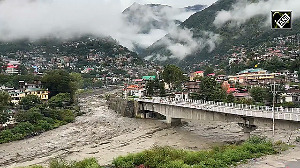Formula One is racing towards a brave new world and the promise of much more excitement for far less money.
It will be back to the future, shedding much of the space-age technology and highlighting old-fashioned driver skill. The headlines have been set out and now the small print has to be agreed.
But how quickly it all happens remains to be seen, despite optimistic noises this week after teams gave the nod to probably the most radical revamp in the sport's history.
| |||||||||||
Yet he had to admit that it could be 2008, when the confidential 'Concorde Agreement' governing the sport expires and the FIA have a free hand, before some key measures can be implemented.
As ever in Formula One, the devil is in the detail and there remains plenty to chew over.
The first is what sort of engines the cars should have.
Mosley says seven manufacturers -- Ford, BMW, Mercedes, Renault, Ferrari, Honda and Toyota -- are spending a billion euros ($1.21 billion) a year at the moment on engines and that mind-boggling outlay has to be halved.
All are agreed on that.
But while the FIA has suggested reducing capacity from three litre V10s to 2.4 litre V8s, the manufacturers believe it would be more economic to retain the V10s but build them to last for much longer than one race each.
They agreed in Monaco on Tuesday to come up with proposals, to be approved by the FIA's world motor sport council on June 30, within 30 days.
SPANISH TALKS
Talks will start at this weekend's Spanish Grand Prix, the fifth round of a championship so far dominated by Ferrari and Michael Schumacher.
But what if the engine people fail to come up with a solution within the time frame?
"If they don't agree then it gets a little bit more difficult because we can't, before 2008, impose an engine formula," conceded Mosley.
"But it is very much in their interests to agree and I think they will agree.
"I believe we will definitely see a new engine rule for 2006, whether we get our standard ECU (electronic control unit) in 2006 I can't guarantee.
"I can't force them to do that in 2006 but I'd be surprised if we don't get it in the end. I think it will all come together," said Mosley.
The ECU is the electronic 'brain' of a car that runs so-called driver aids such as the traction control systems that help a driver accelerate smoothly out of corners.
Any ban on such systems can only go ahead once there is a standard ECU, provided by the FIA to cut costs and ensure there is no cheating, but there is likely to be resistance from carmakers.
"They don't like the standard ECU because it puts a constraint on engine design and of course on lots of other aspects of the chassis," said Mosley.
NO CONCORDE
The five major European carmakers also remain publicly committed to preparing for their own championship from 2008, however moribund the idea now appears to many commentators.
Contractual commitments with tyre suppliers Bridgestone and Michelin must be resolved before Formula One can move to just one provider. That too is supposed to happen for 2006.
There will also have to be more debate on the sale or loan of cars between teams, a key measure to help new entrants to Formula One.
"There is a strong desire to encourage new teams to come in but understandably existing teams do not want to give up money or privileges as a result of that," said Mosley.
The ace in Mosley's hand however is that in 2008 the FIA can impose what it wants.
By then the Concorde Agreement, set up in 1981 to bring stability to a warring paddock, will be dead and it will not be resurrected. The future lies in individual deals.
"I started the meeting by saying that as far as we are concerned the Concorde Agreement was obsolete and we didn't intend to have another one," said Mosley of his discussions with the team bosses.
"There was no dissent."







